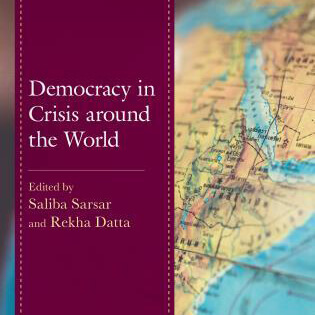A cross-disciplinary cohort of Monmouth University faculty—whose scholarly and teaching interests cover questions surrounding the democratic foundations of individual rights, efficacy and accountability of political institutions, and historical and contemporary challenges to freedom and civil rights—have collaborated on “Democracy in Crisis Around the World,” a new book that examines how the rise of authoritarian regimes and populist leaders is threatening democratic freedoms around the globe.
Due this November from Lexington Books, “Democracy in Crisis Around the World” examines the current and historical factors that have led to the erosion of democracy in five key regions—sub-Saharan Africa, Eastern Europe, Western Europe, Latin America, and the Middle East and North Africa—as well as four major countries: India, China, Russia, and the U.S. The book includes an analysis of how the responses of various governments to the COVID-19 pandemic have affected democratic institutions, making the book particularly relevant as cases continue to rise in many parts of the world.
Each chapter in “Democracy in Crisis Around the World” was written or co-written by Monmouth faculty members whose combined scholarly interests cover a broad range of disciplines: political science, international relations, area studies, American politics, history, criminal justice, and pedagogical analysis. Professor of Political Science Saliba Sarsar ’78 coedited the book with Interim Provost and Senior Vice President for Academic Affairs Rekha Datta; both also contributed chapters.
“There is a huge value to democracy,” Sarsar, a Middle East scholar and expert on the political affairs of the region, said. “Democratic rule is essential for actualizing human potential, more so than other political systems. … Democracy contributes immensely to stability, security, and prosperity. It is unfortunate that, as we watch around the world, authoritarian and populist rule are gaining ground.”
Datta, a leading authority on South Asian affairs, added: “Dreams of freedom and waves of democracy have captured the imagination and aspirations of people around the world for centuries. What we are witnessing, however, is the rise of populist leaders with authoritarian tendencies in both established and fledgling democracies. The question, therefore, arises: What will the underlying causes and impact of such a trend mean for the values of liberty and equality?”
Sarsar said the inspiration for the book came after a collaboration with Monmouth Professor of History and Anthropology Julius Adekunle on another book, “Democracy in Africa: Political Changes and Challenges.” Sarsar said the earlier volume generated the idea “to do a more regional perspective of democracy so we could have a better understanding of what was happening around the world.” His invitation to faculty colleagues to contribute to the book was met with “enthusiastic buy-in and support,” resulting in a work that is more comprehensive than even he had hoped it could be. “We were able to bring together the top experts in many areas,” Sarsar said.
In addition to Sarsar, Datta, and Adekunle, the book’s contributing authors are Professor of History Kenneth Campbell; Associate Professor of Political Science Stephen J. Chapman; Associate Professor of Political Science Kevin L. Dooley; Professor of Criminal Justice Peter W. Liu (who co-authored a chapter with his son, Justin, a junior at Massachusetts Institute of Technology);; Professor of Political Science Kenneth E. Mitchell; Associate Professor of Political Science Joseph Patten; Professor of History Thomas S. Pearson; and Samuel Maynard ‘14, who is currently an instructor in the University’s political science department and a doctoral candidate at the University of Oxford.
As the book’s title suggests, the authors approach the topic from the vantage point that many democratic institutions around the world have reached a critical juncture. Their consensus is that “unless democracy is defended with resolution and nurtured with resilience, it will fail.”
“Democracy cannot function in a vacuum,” Datta said. “It necessitates the participation of all citizens, each bringing their own ideas and commitments to the table, and ultimately all being treated with dignity and honored within that system.… That’s part of the philosophy found in the book.”
“This book is current,” Sarsar continued. “Whether we’re talking about Brexit when we examine Western Europe, or Putin when we speak of Russia and Eurasia, or digital authoritarianism when we talk of China, or populism in Hungary—this is really ahead of other books on democracy at the moment. And the vision it provides for the inclusion of citizens in the democratic process, and the addressing of issues such as COVID—all of it comes together to make this a unique book.”
Sarsar said he hopes in the near future to offer a special topics course related to the issues covered in the book. He envisions that each week a different faculty author could speak to the class on the topics covered in their chapter.
“Ultimately we want to bring this learning and knowledge into the classroom,” he said. “It would be a terrific experience for the students.”
More information on the book is available on the publisher’s website.

